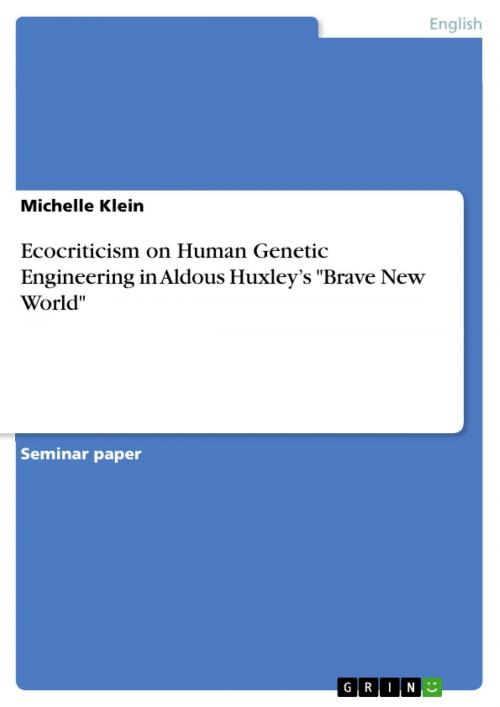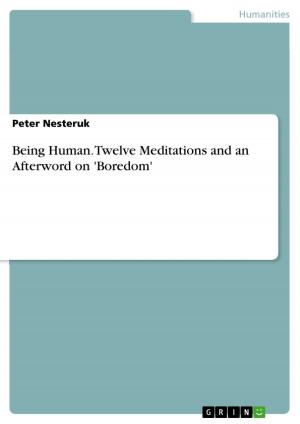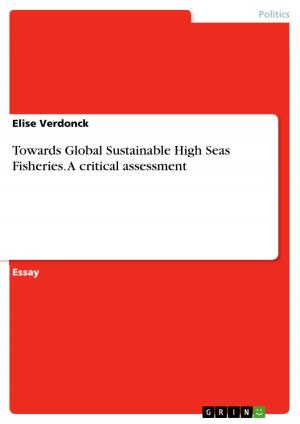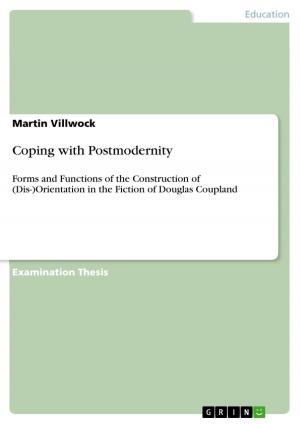Ecocriticism on Human Genetic Engineering in Aldous Huxley's 'Brave New World'
Nonfiction, Reference & Language, Study Aids, ESL, Foreign Languages| Author: | Michelle Klein | ISBN: | 9783668271579 |
| Publisher: | GRIN Verlag | Publication: | August 8, 2016 |
| Imprint: | GRIN Verlag | Language: | English |
| Author: | Michelle Klein |
| ISBN: | 9783668271579 |
| Publisher: | GRIN Verlag |
| Publication: | August 8, 2016 |
| Imprint: | GRIN Verlag |
| Language: | English |
Seminar paper from the year 2016 in the subject English Language and Literature Studies - Culture and Applied Geography, grade: 1,7, University of Koblenz-Landau (Anglistik), course: Ecocriticism, language: English, abstract: Dignity is mankind's unique value, which gives humans the power of self-transcendence. This empowers them to be different to the natural nonhuman species (cf. Heyd 71). Science and engineering establish new ways and opportunities to accomplish the desire to improve humanity. By means of medical and genetic engineering man could be more intelligent, talented, beautiful, and crucially live a healthier and longer life without any particular effort. While this vision generates enthusiasm on the one hand, it triggers anxiety and scepticism on the other hand. Is gene alteration of human nature generally permissible and desirable? Will not authenticity and autonomy go astray when engineering makes us what we are? Are the social impacts sustainable or do we increase social and global inequality? A philosophical debate was raised about these and other questions in the recent years. The English term 'Enhancement' gained acceptance as the collective term for diverse physiological, psychological, cognitive and emotional improvement of mankind. However, I will focus on the advantages, disadvantages and consequences of genetic alteration on humans from an ecocritical point of view. As ecocriticism is multifaceted I decided to take a closer look on the interaction between humans or more precisely, the exploitation of humans by humans. Therefore, I will apply an eco-Marxist approach to the novel which represents an anthropocentric ideology (cf. Benton, 28). The paper consists of three sections. Initially, I will explain the term ecocriticism. Secondly, I shall examine the advantages and the disadvantages of human genetic engineering with the example of Brave New World. Finally, the consequences of human genetic engineering are explored. Eventually, the question Why should we not play God? is clarified by an evaluation of the found out consequences.
Seminar paper from the year 2016 in the subject English Language and Literature Studies - Culture and Applied Geography, grade: 1,7, University of Koblenz-Landau (Anglistik), course: Ecocriticism, language: English, abstract: Dignity is mankind's unique value, which gives humans the power of self-transcendence. This empowers them to be different to the natural nonhuman species (cf. Heyd 71). Science and engineering establish new ways and opportunities to accomplish the desire to improve humanity. By means of medical and genetic engineering man could be more intelligent, talented, beautiful, and crucially live a healthier and longer life without any particular effort. While this vision generates enthusiasm on the one hand, it triggers anxiety and scepticism on the other hand. Is gene alteration of human nature generally permissible and desirable? Will not authenticity and autonomy go astray when engineering makes us what we are? Are the social impacts sustainable or do we increase social and global inequality? A philosophical debate was raised about these and other questions in the recent years. The English term 'Enhancement' gained acceptance as the collective term for diverse physiological, psychological, cognitive and emotional improvement of mankind. However, I will focus on the advantages, disadvantages and consequences of genetic alteration on humans from an ecocritical point of view. As ecocriticism is multifaceted I decided to take a closer look on the interaction between humans or more precisely, the exploitation of humans by humans. Therefore, I will apply an eco-Marxist approach to the novel which represents an anthropocentric ideology (cf. Benton, 28). The paper consists of three sections. Initially, I will explain the term ecocriticism. Secondly, I shall examine the advantages and the disadvantages of human genetic engineering with the example of Brave New World. Finally, the consequences of human genetic engineering are explored. Eventually, the question Why should we not play God? is clarified by an evaluation of the found out consequences.















